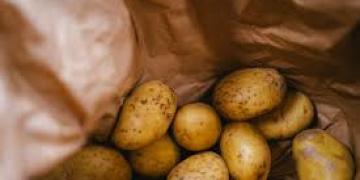Argentina: Industrial potatoes, knowledge, and genetic material are exported from the country.
In recent years, the global potato industry has experienced a period of accelerated consolidation. Mergers, acquisitions, and geographic expansion are redefining who produces, who decides, and who supplies.

What’s happening in Argentina in those sectors that have seen major business movements globally?
Mergers that set the global course
In Europe, the Dutch group HZPC announced the acquisition of IPM Potato Group, the leading Irish exporter of certified seed, strengthening its position in the British and Mediterranean markets. With this transaction, HZPC not only expands its production area in Scotland and the Netherlands, but also consolidates a genetic network that extends from the North Atlantic to Africa and Asia.
Meanwhile, US-based Simplot completed its acquisition of Belgium’s Clarebout Potatoes, one of Europe’s largest frozen potato processors. The merger combines Simplot’s financial muscle and industrial scale with Clarebout’s technological expertise in value-added products—a combination that strengthens global control over industrial potatoes and export flows.
Both movements are clear signals: the potato business is becoming concentrated in fewer hands, and leading companies are seeking to integrate the entire chain—from seed to plate—under a single control logic.
Argentina on the map: Mar del Plata, a new regional hub
In this context of global consolidation, Lamb Weston Holdings, the American French fry giant, opened a 40,000 m² plant in Mar del Plata, Buenos Aires province, in 2025. They aren’t the first—McCain has been in the region for over 20 years—but they do revive a forgotten idea: Mar del Plata has enormous potential as a regional hub.
The project—one of the largest in the recent history of the Argentine food sector—processes approximately 200 million pounds of potatoes per year, generates 250 direct jobs and 3,000 indirect jobs, and supplies both the local and regional markets. Eighty percent of the production will be exported to Brazil through the port of Mar del Plata, which is now positioned as a new logistics hub for Argentine agroindustrial trade.
The plant marks a turning point: for the first time in a long time, a leading multinational company has decided to establish industrial capacity in the Southern Cone to serve the Latin American market, rather than supplying it from the United States or Europe.
Argentina is thus transforming from an importer of technology and know-how into an export platform for finished products, generating high-impact logistical, agricultural, and technological spillovers.
The other side of the business: genetics and seed export
Meanwhile, the Argentine certified seed segment is experiencing its own awakening.
International companies such as HZPC and STET work with local partners to produce and export seeds to Uruguay, Paraguay, and Brazil, and are even planning to open new destinations in Central America.
Likewise, agreements between Germicopa (France) and the Argentine company Agroplant aim to expand the varietal offering and develop genetics adapted to the Southern Cone, combining European knowledge with local multiplication capacity.
For the first time, Argentina is exporting not only industrial potatoes, but also knowledge and genetic material, two intangible assets that were previously almost exclusively imported.
This represents a paradigm shift: the country is positioning itself as a regional supplier of quality seeds, an intermediary link between European laboratories and Latin American producers.
What place does Argentina occupy in the eyes of large corporations?
Today, multinationals in the sector see Argentina as fertile but complex terrain. On the one hand, the country combines natural advantages (soil, temperate climate, counter-seasonal conditions, port infrastructure) and a strong agricultural tradition; on the other, it suffers from a volatile macroeconomic environment and trade restrictions that limit the free flow of inputs and exports.
In the eyes of HZPC, STET, Lamb Weston, and Simplot, Argentina represents a long-term commitment: a closed market with technical human capital, ideal for testing regional integration models.
An export hub for Brazil and the South Atlantic, with competitive logistics costs compared to Asia.
An emerging source of adapted genetics, capable of supplying the wide latitudes of Latin America.
The challenge will be to maintain clear rules, guarantee stability, and foster partnerships that promote technology transfer. If it succeeds, Argentina can move from being an observer to becoming one of the most important nodes on the Latin American paper map.
From the periphery to the center
Major mergers reveal a world where decisions are made far from the fields. But the opening of Lamb Weston in Mar del Plata and the emergence of an Argentine seed export market demonstrate that the south can also innovate, produce, and lead.
The question isn’t whether large corporations are looking to Argentina—they already are—but whether the country will know how to leverage that focus to establish itself as a strategic partner, not just a supplier.
Fuente: potatopro.com




